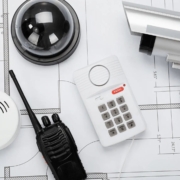5 Mistakes Businesses Make When Choosing a Security System
In a fast-moving city like Las Vegas, security isn’t optional—it’s essential. From retail shops and office spaces to warehouses and hospitality venues, every business faces its own risks. The challenge isn’t just about installing a camera or adding a keypad; it’s about choosing the right system that truly fits your operations, property layout, and daily routines.
Yet many businesses make avoidable mistakes during this process. These mistakes don’t just cost money—they leave real vulnerabilities that could be exploited. Below are five common missteps businesses make when selecting a security system—and how to avoid them.
1. Underestimating What Needs to Be Secured
It sounds obvious, but many businesses don’t fully evaluate what actually needs protection. They think only of entrances and exits but forget blind spots, shared hallways, loading zones, or internal access points like server rooms or supply closets.
Worse, some assume a single camera over the front door is enough. In reality, effective security systems are built around zones of vulnerability, not just visible entrances. Skipping a proper site assessment often results in coverage gaps—areas no one notices until after something goes wrong.
A smarter approach involves walking the property with a security professional who knows how to spot weak points. What you can’t see on your own could be exactly what puts your business at risk.
2. Choosing Equipment Based Solely on Price
Trying to save money by picking the cheapest system might feel responsible in the short term—but it usually ends up costing more. Low-end systems often lack durability, essential features, and ongoing support. They tend to become obsolete faster, meaning you’ll likely pay for a replacement far sooner than expected.
Security isn’t about the sticker price; it’s about value over time. A well-designed system can grow with your business, integrate with other technologies, and stay reliable year after year.
Instead of price shopping, compare based on performance: image clarity, remote access, integration options, response time, and vendor reliability.
3. Ignoring the Importance of System Integration
One of the most overlooked mistakes is failing to think beyond individual components like cameras or access controls. If your video surveillance, alarm monitoring, smart locks, and intrusion detection don’t communicate with each other, you’re missing out on both protection and convenience.
Modern business security systems in Las Vegas are designed to work as a cohesive unit. Integration allows automated alerts, real-time video linked to motion triggers, and simplified control from a single platform. Without this, your team ends up juggling multiple logins, disjointed notifications, and missed events.
Don’t treat security as separate layers. Aim for one integrated system that does it all—and does it well.
4. Overlooking Remote Monitoring and Mobile Access
Las Vegas businesses don’t sleep—and neither should their security. Unfortunately, many business owners choose systems without professional remote monitoring or real-time alerts. That means if something happens outside business hours, there may be no immediate way to respond.
Mobile app control and cloud connectivity have become essential features, but they work best when paired with professional monitoring. Whether you’re offsite for a trade show, traveling, or simply away from the office, having security experts monitoring your system around the clock, combined with instant alerts and live access through your mobile device, provides both convenience and reliable protection.
This is especially important in industries like retail, hospitality, and logistics—where issues often arise after hours. Remote monitoring gives business owners true visibility and control 24/7.
5. Assuming All Installations Are Equal
Security hardware is only as effective as its installation. One of the biggest mistakes businesses make is choosing general electricians or inexperienced installers for the job. Improper camera angles, unsecured wiring, and poor sensor placement can render even the best equipment ineffective.
Professional installation matters—especially in a city like Las Vegas, where businesses face unique challenges, from high traffic to multi-use spaces. A qualified security expert doesn’t just mount equipment; they tailor the system to your property layout, hours of operation, and risk profile.
It’s also about support after installation. If something stops working, you need to know there’s a team who understands the system inside and out—and can get it back online quickly.
Final Thoughts
Choosing a business security system isn’t about checking a box. It’s about protecting your people, your property, and your peace of mind. The wrong decision can leave critical gaps—or worse, give you a false sense of security.
By avoiding the five mistakes above, you put your business in a position of strength. You get not just equipment, but a system designed to work with how you operate and what you value.
For businesses in Las Vegas, Sting Alarm is known for providing tailored, professionally installed security systems that combine advanced technology with reliable, ongoing support. Their team has decades of experience designing solutions that actually work—without unnecessary complexity or guesswork.
To learn more about how they can help protect your business, call (702) 737-8464 today!


